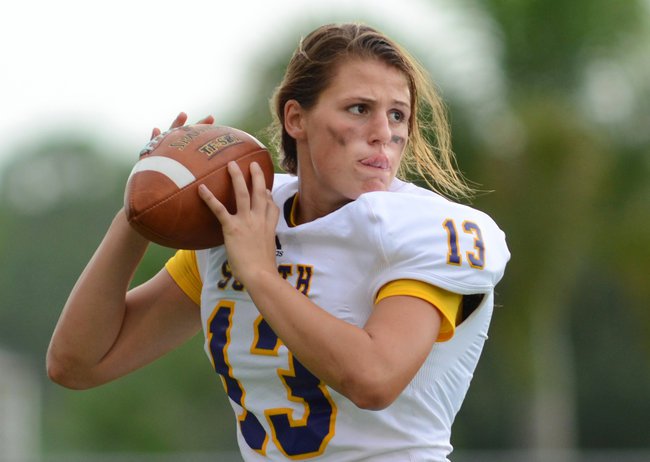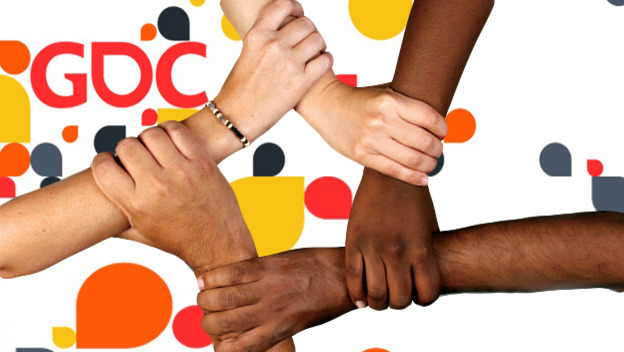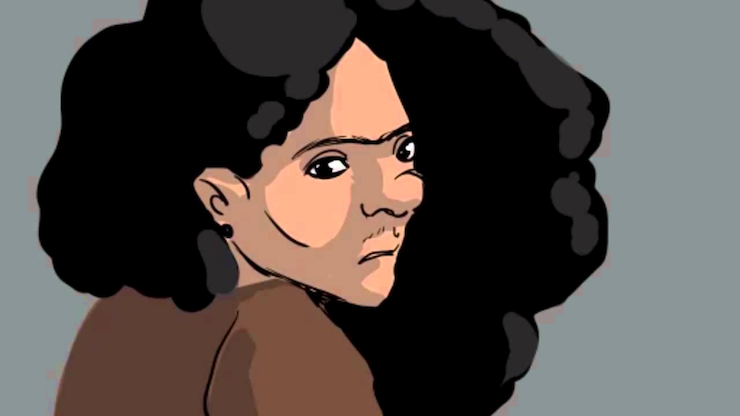(Beware: This post contains spoilers from Stranger Things and Stranger Things Season 2)
Anyone who knows me knows I really can’t do horror. Sure, I can read it, but other than that, it’s a no-go. I avoid horror movies, shows, video games, you name it, like the plague, for my sanity as much as other people’s.
So when Stranger Things came out last year, I was told it “wasn’t that scary,” and attempted to watch the first episode as it came highly recommended. I easily became terrified and didn’t sleep for two days. So the show was a wash for me, and quickly chalked up to “For other people.” I read the plot synopsis so I could be in on conversations, and kind of forgot the show existed.
Fast forward to the weekend before Halloween, where I find myself in a viewing party. Stranger Things Season 2 has just come out, and the folks my partner and I were staying with were determined to watch it. Assuring me, once again, that it wasn’t “that scary,” and then also promising to warn me when anything scary might happen, I ended up watching the whole thing in a 10 hour binge with my partner and four other people.
I have to say, Stranger Things Season 2 was fun, and I enjoyed it a lot. Granted, I spent half of the viewing with my back to the television and humming to myself to stave off being scared, but I enjoyed it nonetheless. However, my non-conventional way of watching the show allowed me to focus less on the horror elements, and more on the characters. Character interactions are not things that can be eloquently described in a simple plot synopsis, and I quickly realized how much of the story I missed from the first season because I didn’t actually watch it.
As much as I enjoyed ST2, t the roles of some of the women in the show bothered me. Perhaps it’s because I recently finished Stephen King’s It, which had similar problems (albeit much MUCH worse). King’s treatment of Beverly throughout the novel was nothing but reduction of a character down to a sex object.
Now ST2 was not nearly as bad. In fact it was nowhere close. But I did notice that there seemed to be a rather disheartening trend and trope in the “Everyone gets One” mentality. That is, every main “boy” gets their “girl.” Even if you have to introduce a girl in the last 10 minutes of the last episode to accomplish that.
So I want to talk about Nancy Wheeler and Maxine “Mad Max” Hargrove. Because they’re the two I see this trope come through with the worst. In fact, both of them present the harmful mentality that often leads men to believing in the “Friend Zone.” That is: Girls only can hang out with boys if they intend to date one. Even if the show didn’t mean to, it subtly set the strange precedent that girls can only be friends with boys if they’re dating.
Nancy seems to be in this sort of relationship with two guys, Steve Harrington and Jonathan Byers. She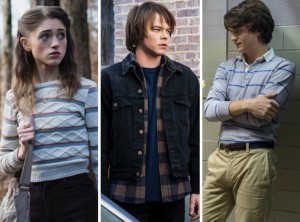 starts out with Steve, who is a subversion of the typical “Jock” trope. He has all the typical “Jock” traits– ‘good’ looks, popularity, is good at sports. The subversion of the typical “Jock” is that he’s not a bully (or well, he got over that in the first season, I think), and ends up being the Mom friend. He even gives terrible dating advice. And, we do see him trying to at least own up to his mistakes. The show does set him up for the problematic, 80s style, ‘take me back you actually love me’ scene, but — thankfully– that is dashed by Dustin and the need for a nail bat. It, at least, was a much better use of everyone’s time.
starts out with Steve, who is a subversion of the typical “Jock” trope. He has all the typical “Jock” traits– ‘good’ looks, popularity, is good at sports. The subversion of the typical “Jock” is that he’s not a bully (or well, he got over that in the first season, I think), and ends up being the Mom friend. He even gives terrible dating advice. And, we do see him trying to at least own up to his mistakes. The show does set him up for the problematic, 80s style, ‘take me back you actually love me’ scene, but — thankfully– that is dashed by Dustin and the need for a nail bat. It, at least, was a much better use of everyone’s time.
Where Steve is the “Jock,” Jonathan is the “Outcast.” He’s shy, not popular, interested in photography, and happens to have the unluckiest brother in the world (Will, trapped in the Upside Down last season and who gets taken over by a Mindflayer in this season. Poor kid). Doesn’t even get invited to the Halloween party everyone’s invited to. You know the type. This doesn’t seem to bother Nancy, she seems fine being friends with both Steve and Jonathan. However, it’s clear that both of them want something more of her.
This is made even more clear, after Nancy has broken up with Steve, and is on the trip to get “justice for Barb” with Jonathan. While comparing the scars from the last big adventure between her, Steve, and Jonathan, Nancy asks something along the lines of “where did you go?” She’s referring to the fact that over the past year, Jonathan has apparently been distant and not hanging out with her as much. I hoped for a logical answer, like “Will’s been having increasing amounts of episodes” or “Mom [Joyce] has a new boyfriend” or…anything. But Jonathan’s answer was “You were with Steve.”
It was such a Nice Guy ™ line I actually groaned. Because the moment he said it, it meant that he believed that, after all they went through in the first season, being friends wasn’t good enough. He believed he deserved her, like some sort of reward. Regardless of what Nancy herself wanted. So it bothered me a shit ton when Nancy ended up with Jonathan at the end of the series. At least Steve, for all his mistakes, screw ups, and self-centered tendencies, had the forethought to ask Nancy what she wanted out of the relationship (and may have realized, in the process, that he wasn’t the best for her). By having Nancy end up with Jonathan, good intentions as he is, I believe the show writers reinforced the idea that if you work hard enough, and are “Nice” enough, you deserve the Girl.
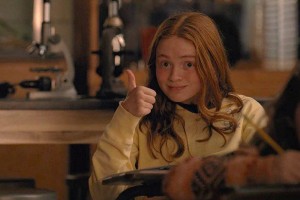 This is seen again with Max. After all, she’s introduced solely as a love interest to Dustin and Lucas. Max almost fails the Sexy Lamp test, in the fact that there are instances where I think she could be replaced with an age appropriate “sexy lamp” and the scene would play out just as well. The object of the boys’ affection, because she is the “new, exotic girl from California” who is also good at video games, they actually resort to straight up stalking her. Which…is not okay. Not in the slightest. Max calls them out, but ends up letting it go because the boys…convince her to be friends with them, I guess. They invite her to go Trick-or-Treating and apparently that makes the stalking not a problem.
This is seen again with Max. After all, she’s introduced solely as a love interest to Dustin and Lucas. Max almost fails the Sexy Lamp test, in the fact that there are instances where I think she could be replaced with an age appropriate “sexy lamp” and the scene would play out just as well. The object of the boys’ affection, because she is the “new, exotic girl from California” who is also good at video games, they actually resort to straight up stalking her. Which…is not okay. Not in the slightest. Max calls them out, but ends up letting it go because the boys…convince her to be friends with them, I guess. They invite her to go Trick-or-Treating and apparently that makes the stalking not a problem.
Stalking is not okay, full stop.
But from there, it becomes this sort of coaxing, bringing Max in to be “one of the guys” but only because Lucas and Dustin have the hots for her (or whatever 13 year olds have for other people). While it’s clear that Max just wants friendship with Lucas, Dustin, and later Will and Mike, there’s always this sort of competition between Lucas and Dustin on who gets to do things with Max.
Luckily, we are spared the “bros before hoes” or awkward love triangle dynamic, because Dustin quickly falls out of the picture due to his “I bet it’s friendly” personality and the fact that he tries to raise an otherworldly monster in his terrarium, but I certainly saw the stirrings of that story line in the making. And Max, inexplicably, ends up with Lucas. Because of course she had to end up with one of them, girls can’t just be friends with boys.
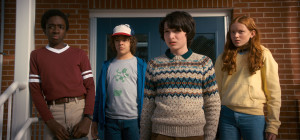 It’s not that Max doesn’t have her own story. She does, in her attempts to escape her abusive household and sociopath older brother. Her skill at video games and skateboarding, and her unshakable, unflappable will despite facing horrors from another dimension. But all of this is undermined by the fact that the focus is never on her, not even when she almost takes off her brother’s junk with a nail bait. The focus is always on the boys.
It’s not that Max doesn’t have her own story. She does, in her attempts to escape her abusive household and sociopath older brother. Her skill at video games and skateboarding, and her unshakable, unflappable will despite facing horrors from another dimension. But all of this is undermined by the fact that the focus is never on her, not even when she almost takes off her brother’s junk with a nail bait. The focus is always on the boys.
Perhaps I’m this critical of Max and Nancy because the show does have women and girls who exist outside of their relationship with the males in the show. There’s Joyce, who shows men and women can be friends–even close friends–and support each other. Just look at her relationship with Hopper. We’re also shown through Joyce what a healthy, supportive romantic relationship looks like, in her relationship with Bob (goddamnit though, Bob.).
And then there is Eleven. God love Eleven. El is a fully realized, fully developed character. And she 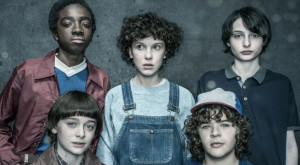 continues to be. Sure, she has her relationship with Mike, but that never started off as an expected. At least, to me it seems to have developed naturally and not been nearly as forced. While I only read the first season, it was never about El getting a boyfriend. It was about El finding friends, finding belonging, proving she was not a monster the Labs were trying to make her. And ST2 was again about El’s search for belonging: This time, for a home. In addition to that, it was about El understanding herself: who she was, where she came from, how to deal with her emotions and fragility. Through all of this, she decides she wishes for companionship outside of just what Hopper can give her as a guardian. She wants friends, maybe something more than that. And she comes home to Hawkins to find that.
continues to be. Sure, she has her relationship with Mike, but that never started off as an expected. At least, to me it seems to have developed naturally and not been nearly as forced. While I only read the first season, it was never about El getting a boyfriend. It was about El finding friends, finding belonging, proving she was not a monster the Labs were trying to make her. And ST2 was again about El’s search for belonging: This time, for a home. In addition to that, it was about El understanding herself: who she was, where she came from, how to deal with her emotions and fragility. Through all of this, she decides she wishes for companionship outside of just what Hopper can give her as a guardian. She wants friends, maybe something more than that. And she comes home to Hawkins to find that.
So, it confuses me, why a show with two great examples of female characters and story-lines in Joyce and Eleven, also has two subpar, objectifying lines with Nancy and Max. Because we know they can write strong female characters, and write them well. They just have to consistently, and constantly, remember to do so.

